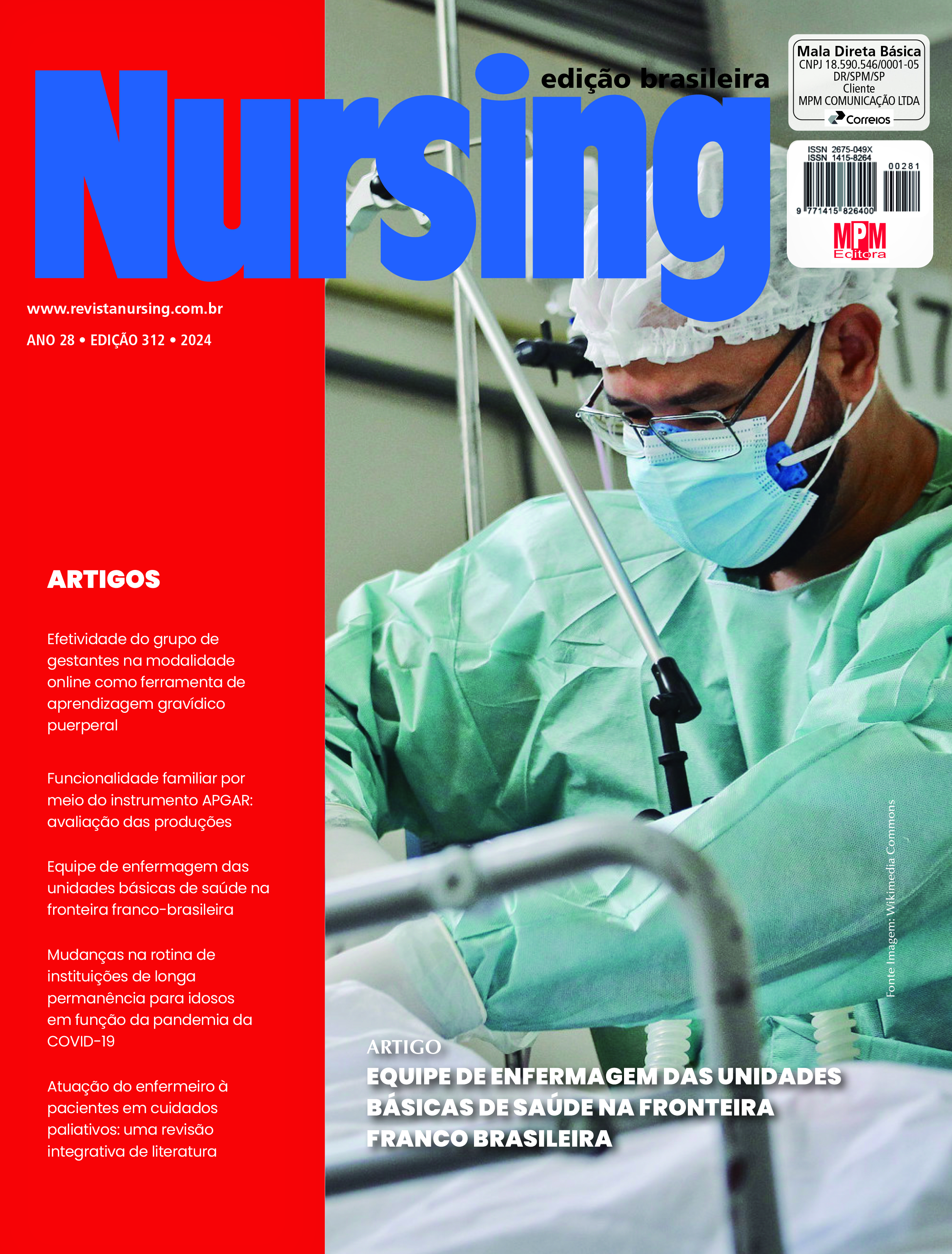ANALYSIS OF THE EFFECTIVENESS OF THE PRENATAL GROUP OF PREGNANT WOMEN IN THE ONLINE MODE AS A LEARNING TOOL IN THE PUERPERAL PREGNANCY CYCLE
DOI:
https://doi.org/10.36489/nursing.2024v28i312p9333-9338Keywords:
Prenatal Education, pregnant women, obstetric nurse, Postpartum WomenAbstract
Objective: To analyze the effectiveness of the group of pregnant women in the online modality as a learning tool. Method: Epidemiological, cross-sectional, observational and descriptive study. The participants were patients who participated in the pregnant women's group, in a natural birth center, in person or online. Data were collected through a structured questionnaire, containing 16 closed questions, about the subjects involved in the course. Result: We verified the predominance of greater correct answers to questions in the face-to-face group compared to the online group. However, it was observed that the average number of correct answers for the online group is around 12.44 out of a total of 16 questions, which is very effective. Conclusion: The online group of pregnant women proves to be an effective tool in the teaching-learning process, as the teachings and sharing of information are absorbed by the majority of pregnant women.
References
Nune GP, Negreira AS, Costa MG, Sena FG, Amorim CB, Kerber NBC. Grupo de Gestantes Como Ferramenta de Instrumentalização e Potencialização do Cuidado. Cid Em Acao [Internet]. 14 jan 2021 [citado 05 mar 2024];1(1):77-90. Disponível em: https://doi.org/10.5965/259464121177
MINISTÉRIO DA SAÚDE. Política Nacional de Educação Popular em Saúde no âmbito do Sistema Único de Saúde (PNEPS-SUS). Portaria nº2.761 de 19 de novembro de 2013. Brasília, 2013.
Vieira-Meyer AP, Freire RW, Dias MS, Silva Júnior FJ, Pinto AG, Forte FD. Estratégia de saúde da família: ressonâncias na atenção, gestão, educação e promoção da Saúde. Interface Comun Saude Educ [Internet]. 2022 [citado 01 abr 2024];26(suppl 1). Disponível em: https://doi.org/10.1590/interface.220555
Pacoaloto da Silva ME, Jurado SR, Gasparelli Feitosa L, Ribeiro Marta IE, da Silva Zuque FT, Valadão FB. Rodas de conversa com gestantes como estratégias para promoção à saúde no período pré-natal. Nurs (Sao Paulo) [Internet]. 27 jul 2020 [citado 15 fev 2024];23(263):3760-5. Disponível em: https://doi.org/10.36489/nursing.2020v23i263p3760-3765>
Rickli EM, Da Rocha Marandola CM, Marques Pinha AP. Educação em Saúde como Estratégia de Empoderamento das Gestantes na Atenção Primária: Relato de Experiência. Saude Em Redes [Internet]. 1 dez 2021 [citado 13 jan 2024];7(2):25-33. Disponível em: https://doi.org/10.18310/2446-4813.2021v7n2p25-33
Silva U, Fernandes BM, Paes MSL, Souza MD, Duque DAA. Nursing care experienced by women during the child-birth in the humanization perspective. J Nurs UFPE on line. 2016 [cited 2023 Aug 13];10(4):1273-9. Avalibale from: https://periodicos.ufpe.br/revistas/revistaenfermagem/article/view/11113
» https://periodicos.ufpe.br/revistas/revistaenfermagem/article/view/11113
Barreto RM, Santos RB, Bezerra ACL, Silva MAM. STD in adolescent: pregnant's perception by the light of the culture circle from Paulo Freire. Rev Contexto Saúde. 2016;16(30):116-25. doi: 10.21527/2176-7114.2016.30.116-125.
» https://doi.org/10.21527/2176-7114.2016.30.116-125
Souza NL, Araújo ACPF, Costa ICC. Social representations of mothers about gestational hypertension and premature birth. Rev Latino-Am Enfermagem. 2013;21(3):726-33. doi: 10.1590/S0104-11692013000300011.
» https://doi.org/10.1590/S0104-11692013000300011
Pereira SB, Diaz CMG, Backes MTS, Ferreira CLL, Backes DS. Good practices of labor and birth care from the perspective of health professionals. Rev Bras Enferm. 2018;71( Suppl 3):1313-9. doi: 10.1590/0034-7167-2016-0661.
» https://doi.org/10.1590/0034-7167-2016-0661
Nascimento RLM, Rodrigues RPM, Freitas WMF. Projeto roda bem gestar: interdisciplinaridade para fortalecimento do cuidado à saúde da mulher. Rev Temas Em Educ [Internet]. 26 jan 2021 [citado 04 abr 2024];30(1). Disponível em: https://doi.org/10.22478/ufpb.2359-7003.2021v30n1.54304
De Lima MM, Aranha ME, Leal CD, Costa R, Zampieri MD, Custódio ZD. Grupo de gestantes e casais grávidos: educação em saúde em tempos de pandemia. Extensio [Internet]. 26 ago 2021 [citado 11 abr 2024];18(39):197-208. Disponível em: https://doi.org/10.5007/1807-0221.2021.e76818
Maria de Lima M, Andrade Leal C de, Costa R, Motta Zampieri M de F, Frello Roque AT, Aparecida Custódio Z. Gestação em tempos de pandemia: percepção de mulheres. Revista Recien [Internet]. 29º de março de 2021 [citado 14 abr 2024];11(33):107-16. Disponível em: https://recien.com.br/index.php/Recien/article/view/355








